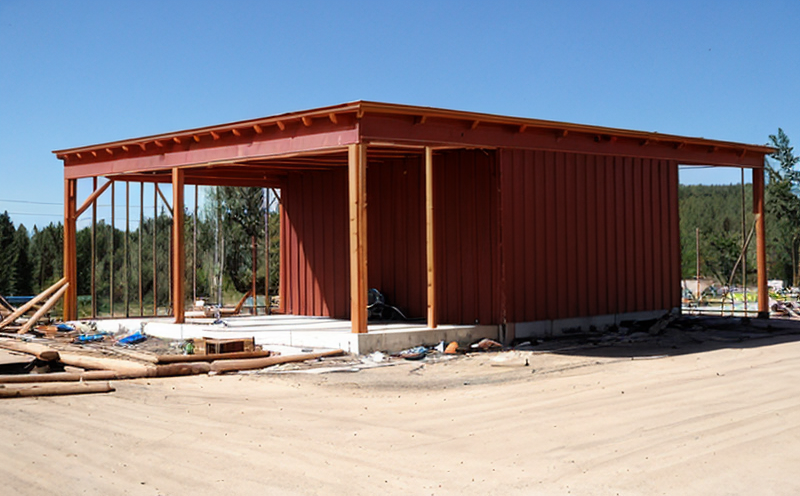ASTM E797 Thickness Testing of Steel
The ASTM E797 standard specifies the procedures for determining the thickness of steel products by magnetic testing. This service is crucial in ensuring that structural integrity and compliance with industry standards are maintained throughout the manufacturing process.
Structural integrity assessment using ASTM E797 is particularly important for industries dealing with large-scale steel structures such as bridges, offshore platforms, and construction projects. The thickness of steel components directly affects their ability to withstand mechanical stresses and environmental factors like corrosion. Inaccuracies in thickness can lead to premature failure or structural instability, which could result in significant safety hazards and financial losses.
The testing process involves the use of magnetic thickness gauges that measure the depth of the magnetic field penetration into the steel surface. This non-destructive method allows for quick and accurate assessments without altering the integrity of the sample being tested. The accuracy of these measurements is critical, as even small variations in steel thickness can have significant impacts on structural performance.
During specimen preparation, the steel samples must be cleaned thoroughly to remove any dirt or rust that could interfere with the magnetic field readings. This step ensures reliable and consistent results. After cleaning, the samples are placed into a testing machine where the magnetic thickness gauge is applied according to ASTM E797 specifications.
The process of determining the thickness involves several key steps:
- Selection of appropriate calibration standards;
- Application of the magnetic field over the steel sample;
- Measurement of the induced magnetic flux density;
- Analysis of the data to determine the thickness.
The results are then compared against accepted tolerances specified in ASTM E797. Any deviations from these standards require further investigation and corrective action to ensure that all components meet the required specifications.
By adhering strictly to ASTM E797, laboratories can provide accurate and reliable thickness testing for steel products. This ensures not only compliance with industry standards but also enhances product quality and safety.
| Key Parameter | Description |
|---|---|
| Magnetic Field Strength | The strength of the magnetic field applied to the steel sample during testing. |
| Data Interpretation | The process by which measurements are analyzed and compared against accepted tolerances. |
| Calibration Standards Used | Description |
|---|---|
| Type 1 Standard Test Block | A block made of a material with known thickness used for initial calibration. |
| Type 2 Standard Test Block | A block made of a different material but having the same magnetic properties as the steel being tested, used for final verification. |
Scope and Methodology
The ASTM E797 standard defines the scope and methodology for thickness testing using magnetic techniques. This section will delve into both the theoretical underpinnings and practical application of this method.
| Key Parameters | Description |
|---|---|
| Magnetic Flux Density | The strength of the magnetic field in Tesla, used to measure thickness. |
| Calibration Procedure | The process by which the instrument is adjusted using known standards before testing. |
| Testing Process Steps | Description |
|---|---|
| Application of Magnetic Field | The magnetic field is applied uniformly across the steel sample using a coil or similar device. |
| Data Collection | Measurements are taken at various points on the surface to ensure uniformity and accuracy. |
| Analysis of Results | The data collected is analyzed against accepted standards to determine compliance. |
The methodology outlined in ASTM E797 ensures that all measurements are consistent and reliable. The use of calibrated instruments and standard test blocks guarantees accurate readings, which are essential for maintaining high-quality steel products.
It is important to note that while magnetic testing provides a quick and effective way to determine thickness, it may not be suitable for all types of steel or in every application. In some cases, ultrasonic testing might be more appropriate, depending on the specific requirements of the project.
Customer Impact and Satisfaction
- Enhanced Quality Control: By ensuring that each component meets strict thickness specifications, customers can rest assured that their products are built to last.
- Increased Productivity: Faster testing times mean less downtime for production lines.
- Better Compliance: Ensuring adherence to international standards like ASTM E797 helps companies avoid costly legal issues and penalties.
- Improved Safety: Accurate thickness measurements help prevent potential structural failures, enhancing overall safety.
- Cost Efficiency: Early detection of defects through thorough testing reduces the need for expensive repairs or replacements later in the production cycle.
Customer satisfaction is paramount. By offering precise and reliable ASTM E797 thickness testing services, we help our clients achieve their quality goals efficiently and effectively.
International Acceptance and Recognition
The ASTM E797 standard has gained widespread acceptance in the metallurgy sector due to its reliability and accuracy. This method is widely used across various industries, including construction, automotive, aerospace, and marine engineering.
American Society for Testing and Materials (ASTM) standards are recognized worldwide as benchmarks for quality assurance. The international acceptance of ASTM E797 ensures that products tested meet the highest global standards, fostering trust among clients and stakeholders.
By adhering to these stringent testing protocols, our laboratory contributes to maintaining high-quality steel products globally. This commitment to excellence has earned us a reputation as a leader in metallurgical testing services.





